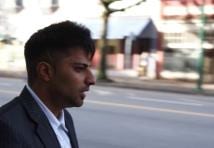The September 27, 2008 assault on Jordan Smith in Vancouver’s Gay Village was a hate crime, a BC Supreme Court judge ruled April 30.
Smith and his partner had been walking hand in hand when homophobic taunts preceded the assault that left Smith unconscious on a sidewalk, his jaw broken.
Justice Joel Groves called the assault “vicious” and “senseless.”
He said a severe sentence was needed for Michael Kandola and sentenced him to 17 months in prison.
Minus five months for time served, Kandola will spend the next year behind bars.
“Hatred is a motivation in this crime,” the judge ruled. “There is no other explanation for what happened on that date.”
“Mr Kandola must know that his actions are not only contrary to the law but are abhorred by Canadian society,” Groves said.
“It is hard to fathom in this day and age how two men holding hands can cause such a visceral reaction in the accused,” Groves said. “In Canada, people are free to live their lives as they choose, be they heterosexual or homosexual.”
While Smith was not in court, due to work obligations, his partner, Charles McKay, who was also confronted by Kandola that night, was in court for the ruling.
“Wow,” he said as he realized the judge was going to be as severe as he could be in sentencing. Tears streamed down his face.
He said outside court the sentence allows him some closure.
“I didn’t realize I would be so emotional about it,” McKay said.
“It should make people aware,” he said. “I loved how [Groves] said Canada is not a place that accepts this kind of behaviour.”
Groves said the sentence should act as deterrence to those who might also consider crimes motivated by hatred.
“Those who act like he [Kandola] did on Sept 27, 2008 must know that there are real consequences for their behaviour,” Groves said.
Kandola was originally charged with aggravated assault but pleaded guilty in March to the lesser charge of assault causing bodily harm.
The charge stemmed from the attack on Smith at the corner of Davie and Hornby streets in Vancouver’s West End.
Smith and his boyfriend, McKay, had been walking up Davie St holding hands when they heard taunts of “Faggots,” “What the fuck is this?” and “Why are you faggots holding hands?” from a group of men behind them.
Groves called the behaviour “bullying.”
Smith let go of McKay’s hand and turned back to ask the men what they meant.
Groves dismissed the submission from Kandola’s lawyer, Danny Markovitz, that this was an act of provocation on Smith’s part.
“The circumstances are that Mr Smith arrived at a corner and was assaulted, he was bullied,” Groves said. “There is no evidence here that anything Mr Smith said or did constituted provocation.”
Groves said the “gang” then backed Smith up into range of a video camera at the 7-Eleven at the corner.
Groves said the video clearly showed Kandola then circling around behind Smith, “dramatically winding up and hitting the accused from his blind side.”
The video is consistent with statements of witnesses.
One witness, Groves said, told police “all of a sudden, the accused (Kandola) hauled off and sucker-punched the victim right in the face.”
The judge noted it was only when a cab driver yelled that he was filming the event and that the police were on their way that Kandola stopped the attack and the group fled.
“The physical injuries to Mr Smith were significant,” Groves said, noting Smith needed emergency surgery for a broken jaw, had his jaw wired shut and suffered a concussion.
Groves noted that the fact Smith was unconscious on the ground did not stop Kandola’s assault. He said one witness stated Kandola continued to scream obscenities at the prone Smith and threatened to “do him in.”
Markovitz had submitted that though homophobic language was used before and after the offence, no slurs were uttered while the punch was thrown. Therefore, he had argued, it could not be a hate crime.
Groves disagreed.
“It is a continuous, flowing event,” he ruled.
“Hatred is a factor I must consider in sentencing.”
In order for him to rule the assault a hate crime, Groves said the Crown needed to prove homophobic language was used before, during or after the assault; that the attack occurred in a gay area; that there was no previous interaction between the parties; and that no alternate explanation was available.
He said Crown prosecutor Dasein Nearing proved all those factors.
Kandola’s lawyer, Danny Markovitz, asked to read a letter of apology from his client before the judge began to pass sentence. He acknowledged it would have “absolutely no effect” on sentence.
“I apologize,” Kandola said in the letter read to the court. “I am not now nor have I ever been a person who discriminates against gay people.”
Outside court, McKay called the letter “a joke.”
“I’d like to believe and hope the letter was genuine,” he added.
Groves found “the evidence of remorse in this case is limited and late in the day.”
In imposing sentence, Groves noted the offence occurred prior to Parliament’s removing the two-for-one recognition of time served in jail prior to sentencing.
As Kandola has served 2-1/4 months in jail on the charge, that means he gets five months’ credit on the 17-month sentence.
In addition to the sentence, Kandola must serve a year’s probation, not be in downtown Vancouver, including the Gay Village, for that period and cannot contact Smith or McKay. He must also perform 50 hours of community work service.
“You are young. You have time to change your ways,” Groves told Kandola. “It is not too late for you to turn your life around.”

 Why you can trust Xtra
Why you can trust Xtra


